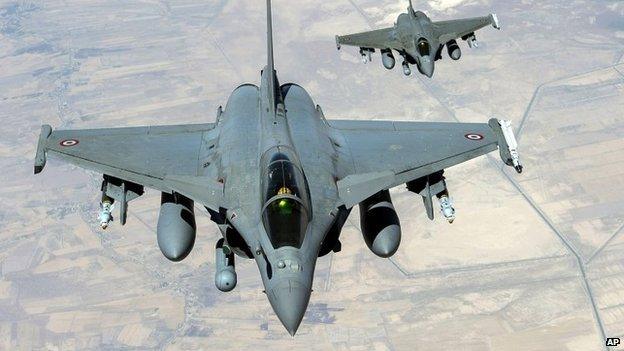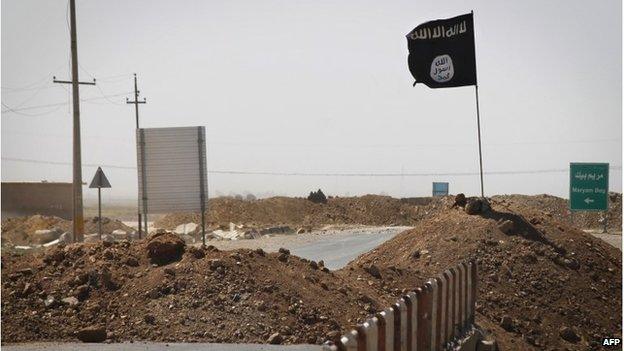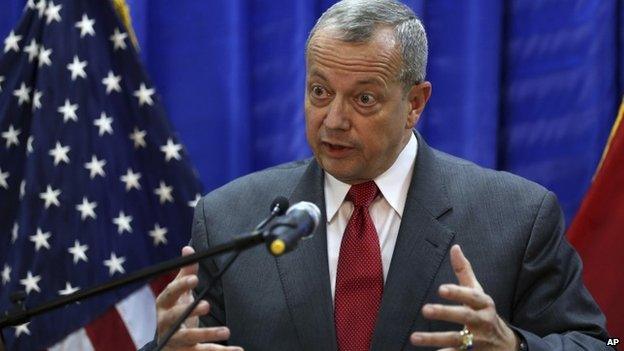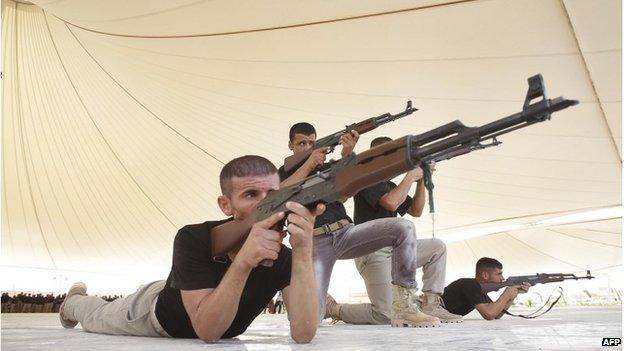Iraq's battles need sense of resolve
- Published

Air strikes by Western nations are helping Iraqis, their prime minister says
In Iraq's capital, you hear many stories about a harsh new order being imposed, measure by measure, by the group calling itself Islamic State in the second city of Mosul.
"Female doctors say they now have to cover their hands with surgical gloves so thick they can't carry out medical operations with them," an Iraqi doctor in Baghdad told me.
"Families are hiding disposable diapers under their beds because even they've been declared un-Islamic, along with so many other things," recounted a politician who described some of the latest details relayed in hushed conversations and furtive messages between two different worlds in one country.
You also hear reports that IS, which seized Mosul and large swathes of territory across Iraq in a lightning sweep in June, are now paying their fighters higher salaries than the Iraqi military receives.
And you begin to hear details about what will have to be - to use a phrase from an earlier Iraq war - "the mother of all battles" to retake the major northern city where IS forces are also entrenching their military grip.
"It's not a single battle. It's a campaign," cautions the retired US marine appointed by President Barack Obama to co-ordinate efforts of the wide US-led international coalition.
In a briefing with a small group of journalists in Baghdad, Gen John Allen was asked whether the "window of opportunity" to retake Mosul could close over time as it becomes increasingly hard to dislodge IS fighters.
"I think that's a fair question," replied the officer who was the US's deputy commanding general in Iraq's Anbar province in 2006-2008 during what was called the "Sahwa" or Awakening campaign against al-Qaeda forces.
"I would say that Mosul will kick off within a year," he answered, choosing his words carefully.

Islamic State militants have been consolidating their positions across the territories they have seized
"I really can't be more specific," he said, adding "when it's undertaken, the right kind of planning and preparation will have been done to make sure the outcome will favour the Iraqis."
Similar caution was expressed by other sources in Baghdad who are closely tracking Iraq's efforts to rebuild its own security forces after they collapsed in the face of the brutal IS advance.
"Isil is digging in, in increasingly defensive positions," one source said, using another of the names given to the group. "It will be a long drawn out process to dislodge them."
But the battles will be no less difficult in other parts of Iraq. Depending on how you calculate the percentages, IS fighters still hold anywhere from a quarter to a third of Iraqi territory.
Hundreds of Western and Iraqi air strikes since 8 August have not fundamentally altered the new map although many say it would look even worse if the aerial campaign had not been unleashed.
Better intelligence
When I interviewed Iraq's new prime minister in Baghdad last week, along with colleagues from the BBC's Arabic TV, Haider al-Abadi told us air strikes had made "a huge difference".
"We have controlled and contained the threat in areas where Iraqi forces are fighting," he insisted.
"My worry," he admitted, "is we have to liberate all areas including Mosul and Anbar… and I have to win over local people in these areas to do that."
The prime minister also pointed that air strikes had recently intensified.
A senior government source told me that was because they were now receiving better intelligence on the ground, particularly from Sunni tribal leaders in Anbar province, west of Baghdad, which is largely held by IS.
But reports from recent battles in Anbar underline that, in some areas, tribal fighters opposed to what they still see as a Shia-dominated government in Baghdad are aligned with IS fighters. They have inflicted crushing defeats on badly organised and poorly motivated Iraqi security forces.
That has included the savage beheadings that have marked the IS march.

Gen Allen wants to underline the need for leadership in the fight against extremists
On his first trip to Baghdad to meet Iraqi leaders in his new role, Gen Allen repeatedly emphasised the importance of "a full blown conversation" between Iraqi forces and Sunni tribes, similar to the US's engagement when their forces were battling against al-Qaeda.
Another challenge is how to incorporate Shia militias loyal to powerful clerics with strong longstanding links to neighbouring Iran.
Some are now fighting alongside Iraqi forces in certain areas.
Many are loudly opposing the international coalition, and in particular the involvement of US and UK warplanes, although their actions have been more restrained.
A few days ago, missiles were fired at the US embassy in Baghdad in what was believed to be an attack by one of the Shia militias.
Prime Minister Abadi told us: "I tell the Iranians this international coalition is working to the benefit of Iraq so they shouldn't feel threatened... that this is not a threat to them."

Shia volunteers are ready to fight - but their incorporation may incite Sunnis
Sources say Iran was initially reluctant to back Haider al-Abadi to replace Prime Minister Nouri Maliki whose narrow sectarian approach and corrupt administration alienated Iraq's Sunni community and also angered some of his own supporters.
A senior Iraqi official told me emissaries were sent to Iran's spiritual leader Ayatollah Khamenei to underline the seriousness of the crisis.
"Our defeat in Mosul was about corruption," is how he explained the disintegration of several Iraqi army divisions and an initial welcome by local people.
New army ethos
Efforts are now under way to rebuild and restructure the Iraqi army with new appointments and what will be a lengthy process of training and equipping a new force.
Gen Allen highlighted how Iraqis told him that "success or failure in the battle space, regardless of weapons, was often a function of leadership".
Others speak of "completely rewriting" the army's military doctrine to build a new national ethos.
The other main focus now is the development of a National Guard which will aim to incorporate various local forces in units to be established in every province.
Iraq PM Haider al-Abadi: "l don't know what is going to happen in the future...so I am taking all opportunities possible"
Several politicians, both Sunni and Shia, expressed concern that it could end up reinforcing the pressures now pulling Iraq apart.
But Prime Minister Abadi has made the National Guard one of his top priorities, arguing "the only way forward is to use local forces".
In the end, the battle for Mosul and everywhere else will not be a numbers game.
It will, as one military source put it, come down to "who's got the most reason to stand there and fight".